Dancer Vija Vētra: I would also like to write a book
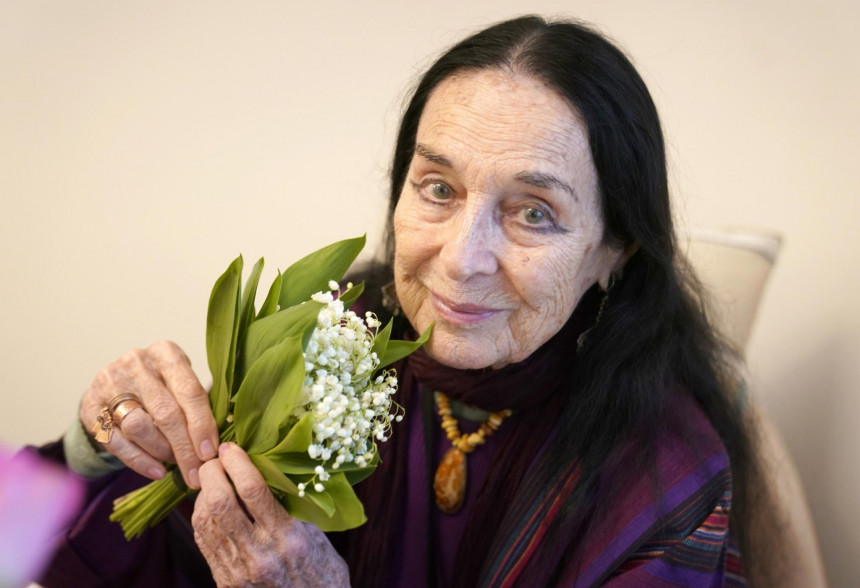
"I have never seen a sky as beautiful and as blue as the one I saw when I came out of the basement of the house in Vienna that was bombed by the Russians... I was only twenty years old then. It is impossible to believe what is happening in Ukraine today - it brings back the memories of World War II," says Vija Vētra, a legendary Latvian dancer, pioneer of the Indian and sacral dance movement in Latvia, artist and dance teacher living in New York. On February 6 this year, she crossed the 99-year threshold of her life.
On Thursday, June 16, at 7 pm in the Gold Hall of the Riga Latvian Society House, Vija Vētra will give a concert "Dance of a Lifetime". The outstanding artist will also dance at this event herself, to approach her 100th birthday and the 79th anniversary of her creative and stage life. The concert will also feature a tribute to the legendary dancer by the great pianist Vestards Šimkus, who will perform Claude Debussy's prelude "The Sunken Cathedral", his own composition "Sunflowers" and Pēteris Vasks’ "Green Landscape". Together with Vija Vētra, the great pianist will also perform improvised music and dance based on ancient Greek mythology.
The concert "Dance of a Lifetime" will feature choreographies created by the artist herself and performed by the dance group Rituāls. The concert will also feature dancers from the Agris Daņiļevičs’ dance school Dzirnas and will be hosted by actress Raimonda Vazdika.
The artist plans to spend the whole month of June in Latvia, giving masterclasses and showing an exhibition of her artworks. To make her plans come true, the Vija Vētra Foundation invites everyone to support the artist by attending the "Dance of a Lifetime" concert and by donating to Vija Vētra (donation account: LV86HABA0551046176968).
Moments before Vija Vētra’s centenary "Dance of a Lifetime", Neatkarīgā had the exclusive opportunity to meet the legendary stage artist - as every time she visits Latvia.
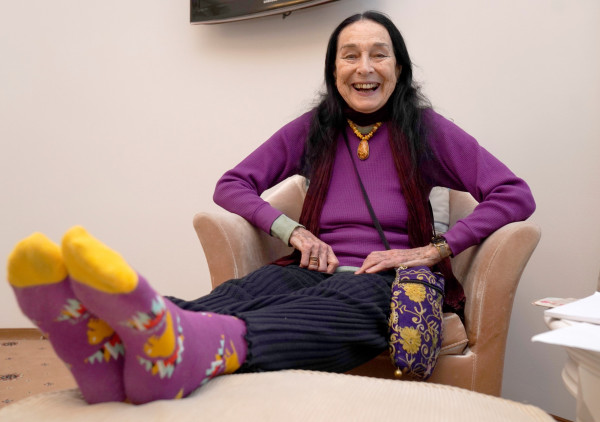
The last time we met in Latvia was in the summer of 2019, before the world was struck by the Covid pandemic, because it later stopped your annual tradition - in June, during the lilac blossom season, to visit your homeland again for a while. How did this time pass for you?
Actually, it has been very hard. First of all, I took a risk and stayed in Latvia longer than I was allowed to in the summer of 2019 - in order to receive my minimum monthly allowance, it is only one month that I am allowed to be away from home in America. In fact, I always stayed in Latvia much longer and never got caught, but in 2019 I got caught. It so happened that a few days before I left, I got pneumonia here, I had to cancel my plane ticket, and as a result, I came back to New York much later. And because I was caught being away too long, the first month after I came back I didn't get any allowance - I couldn't pay the rent, I had to borrow money to keep from being thrown out of the apartment... The next month I only got half of what little I was paid, but all the trouble brought me close to a nervous breakdown, because - I have nothing else, I'm just living on this little allowance there. It was a terrible time, it was very hard for me. And then came the Covid...
Did you get sick?
In America, they only started talking about Covid in March 2020, but in February of that year I got pneumonia again - I was at home sick for a whole month. It was horrible. I think it was Covid that went to my lungs. Because the symptoms were exactly the same - runny nose, temperature, difficulty breathing. It was really an extremely difficult time for me, and the more than two and a half years that I couldn't come to Latvia were spent in a rather deep depression. Because I had no computer, I was also completely cut off from the outside world, I had no means of communication. My other colleagues could at least stream during the pandemic, they could continue their activities online, but - what is happening now with all this streaming?! That's where every dilettante shows off! Everything is now so dilettantish that it is scary.
Yes, it was very difficult for me in America. There, people are concerned only with themselves. Of course, there are exceptions, but for the most part, it's me, me, me. Even if a neighbor asks how I'm doing, he's not really interested in what I'm saying - I’m often left in half a sentence, half a word, because he's in a hurry. That's America.
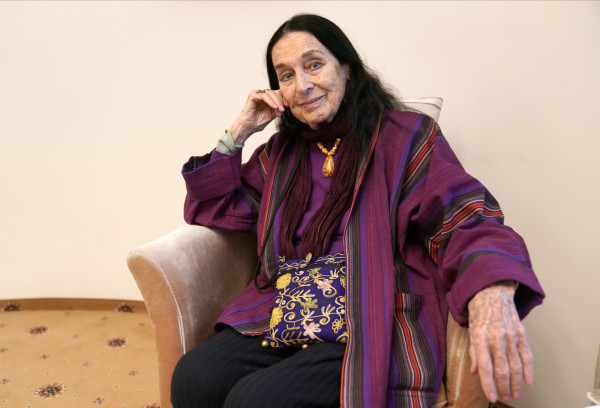
Is it different in Latvia?
At least for me, it's very different in Latvia - I feel that I am welcome here, that I am loved here. They call me, ask me how I feel, listen to me, support me. The same Māris Blanks you just met (he had invited the artist for lunch before our conversation) - he calls me regularly to see how I am feeling. A very, very warm person. He went through Siberia himself, a man who knows what it means to suffer. We go back a very long way, we met in America when he came to study business in 1988. By the way, we met at the director Laimonis Siliņš, who was then running a small theatre in San Francisco. I was living in California at the time and working in that theatre as an actress. I played the role of Mrs Omarty in Anšlavs Eglītis' play “Mrs Omarty”, which is a story about Latvian immigrants in 1950s America.
Well, yes, I feel at home in Latvia, although I don't have a home here. When I started coming to Latvia in the 1990s - Imants Ziedonis is responsible for that, he invited me and helped me to organize my first play in Latvia on the big stage at the National Theatre - I applied for the country home and land that belonged to my relatives on my mother's side and where I spent all the summers of my childhood. But I didn't get it, other suitors were already ahead of me.
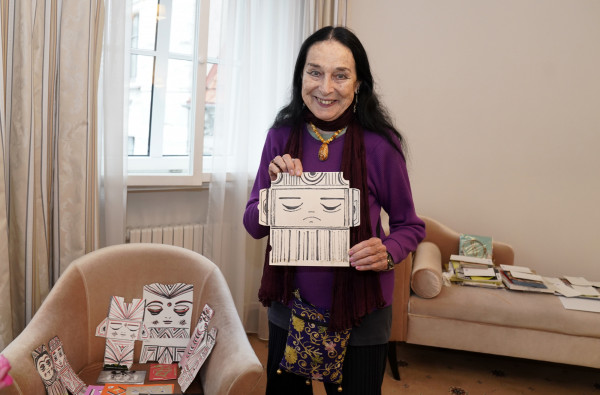
How did you spend your childhood summers?
In Zemgale, near the Apgulde station. I spent all my childhood summers there, in the Villiku home, and I remember everything very well. Our relatives on my mother's side lived there - the owner's daughter was my mother's second cousin. I should write a book about my childhood memories in the countryside, because now children and young people have a completely different life, they are not attracted by the countryside. But I did all the farm work, I was even allowed to milk one cow, until she hit me in the face with her tail so hard... The owners had at least thirty cows - they were quite rich, like the people of Zemgale - and I was also a shepherd. I knew each cow by name, and I still remember one - she was black with a white head. It was Prince, who always disappeared into the woods when I went to pasture, only to come out of the woods when I drove the cows home. I never knew where she was. Our young people no longer have such adventures and cannot have them, because the countryside is no longer what it was in the days of Ulmanis. Ulmanis himself was the son of a farmer, and he was a very good leader for Latvia. Whatever the accusations against him now, he was close to his country, and that was the only time when Latvia really flourished. There is nothing to reproach him of, I think.
What is on your mind most today as you follow events in Latvia and the world?
As you know, I am already in my 100th year. I lived through World War II, and it was a terribly difficult time. I know what it was like to be bombed. I was studying dance at the Vienna Conservatory at the time and, can you imagine, the Russians bombed beautiful Vienna too! I will never forget what the Vienna Opera House looked like when the bomb hit it - the back of the building was practically sawed off. I remember that there were alarms and bombings twice a day, around noon and midnight. People were not even allowed to sleep. Once I was walking to my dance lessons when another alarm sounded and everyone rushed to the building opposite the conservatory, where we hid in the basement. The house was bombed, all the exits from the basement were blocked, the dust got into the basement, there was nothing to breathe, there was panic, there were so many people, and I thought I was going to die... I was only twenty years old, and I remember thinking at the time: Is it really the end for me, so young, not yet having achieved anything...? Is this really it...?! It was insane. When we were dug out and I saw the sky again, I cried - I have never seen a sky so beautiful and so blue in my life... I am close to crying even now. War is so terrible...
Did the Russian invasion of Ukraine stir these emotions in you again?
Of course, because I have been through it all and I know what it is like. It is such madness, what that power-hungry man is doing! I’ve heard that he has cancer, I hope he dies soon! All that the Ukrainian people are going through today is familiar to me. I, too, became a refugee - because the Russian army also came to Vienna. I was lucky enough to get on the last refugee train going west from Vienna, but my best friend, an Austrian who I studied with at the Vienna Conservatory, stayed in the city and was raped by the Russian soldiers... She had no experience with men yet, and it was such a trauma for her that she wanted to kill herself...
I am very concerned about this situation with the war in Ukraine, and I am very worried about Latvia. When I talk about it in America, they are surprised: oh, Latvia is so close to Ukraine? They do not know where Latvia is. Fools! Of course, they are horrified about the war, they help as much as they can because their hearts are in the right place, and yet the Americans are very far away from all this. The craziest thing is that Trump wants to get back into power because Biden has supposedly stolen his job. And if he gets back in with Putin's help - Putin is a great friend of his - then Latvia is in danger. Because he is against NATO, he believes that everyone has to defend only themselves.
Do you think he has a chance of again becoming the President of the United States?
Yes, he does, because there are a lot of fools in America who vote for that idiot, and that's where the trouble lies. I am horrified, I do not understand how it can be that after all he has done, they still want him back! He is insane, just like Putin. He is power-hungry, he wants to rule the whole world, and there are so many fools who support him.
Tell me, please, how you celebrated your 99th birthday in America.
On my birthday I went with some friends to a small restaurant. But I celebrated again because, in that artists' house in Manhattan where I have lived for fifty-two years, they gave me a room where they usually have concerts, literary evenings and film showings - so that I could celebrate my birthday. In the past, I celebrated my birthdays in my studio, and it was always a ritual of dancing with a candle - everyone would form a circle, I would walk in the middle of the circle and start the ritual with a candle in my hand. Then I would give the candle to the next person who walks in the middle of the circle and through dance expresses his good wishes to me, the birthday child. In this way, the candle goes around the circle until it comes back to me and I finish the ritual. This time was a little different. I invited my Latvian friends, who came with flowers - Americans don't give flowers, hardly anyone does that - and everyone brought a treat, so there were about twenty-seven of us. First I showed them a film about me by Ināra Kolmane ("Vijaya", Studio Deviņi, 2004), which they had not seen, and we watched a fifteen-minute film of my dances, and then I invited everyone to gather in a circle and I held a ritual - a prayer for the Ukrainian people. I had one candle and a Tibetan gong, and I said what I had to say and then I struck the gong, which was like "Amen!" Then I passed the candle on, and everyone who had a candle went to the middle of the circle and said a wish for the Ukrainian people, for the victims of the war, and at the end of each prayer, I said "Amen!" with the gong. We finished it all with a simple circle dance - because the circle underlines the sense of togetherness. That is why so many folk dances are danced in a circle. That was my birthday.
Have you thought about how you will celebrate your 100th birthday?
If I come to Latvia again next year, I will not be a hundred years old, but already five months into my 101st year...
Why do you say - if you come?
You never know... Even the flight from America is very, very difficult. It's about fifteen hours in total - you have to be at the airport three hours before departure, then the flight itself, then you have to change planes, then you have to wait there again for a couple of hours. It's really very difficult for me.
Well, then don't leave. You have always dreamt of staying here in Latvia at the end of your life. Are you sure you haven't found that opportunity?
It's not that simple. Yes, I've been thinking about it for a long time, and a lot has been done to make it happen, but - there's nowhere for me to stay! It's been impossible to find a solution for years. Yes, I was offered a small apartment in Purvciems several years ago, but the majority there are Russians. I will not go to live with Russians if I return to Latvia! I would like to live in the Old Town, but they don't give me anything that suits me. Or - my own house, my own garden. As a Latvian, I love to work in the garden, to plant, to grow. You know, I have to tell you a story. In Greenwich Village, where I live, which is the nicest place in Manhattan, there are a lot of ginkgo trees. Its fruit is widely used in medicine, especially by the Chinese - because they know what is good. There are female and male trees, and if they are close together they have “sex” and then the fruits grow. They are soft and if you step on them, they smell awful. But inside that fruit is the life force, everything that is needed for a new tree to grow. Just like in an acorn, just like in a chestnut. I gathered the fruit, carefully, carefully, so it wouldn't fall apart, took it home and put it in a pot with soil. They started to grow - one leaf, another, a third, stretching out three feet. I was so happy! Later I brought them to Latvia, gave two to Māris, whom you met. I told him to put them in the greenhouse because they were not used to the cold of Latvia. He put one in the greenhouse and it grew beautifully. Later he put it outside, it took root and grew quite big, literally his height. The other one, the little one, was not put in the greenhouse and it froze in the winter. But every spring, the little one still tries and puts out new leaves. It really wants to grow. Whenever Māris calls me to ask how I am, I ask how my ginkgo "children" are doing. Once I said to him: "As long as this tree is alive, I will be alive." But - this winter, the big tree died...
But the little one is still fighting and wants to grow, wants to live!
Well, yes, the little one is fighting. Every winter he freezes and every spring he tries again. But the other one had grown so big... I am so sorry that telling you about this makes me cry again. It was life, it was grown and nurtured by me, it wasn't just a tree...
Having entered your 100th year, can you say that a long life is beautiful?
In my case, difficult. Very difficult. I've been through war, I've been buried in a bombed-out house, but I got through. It's also beautiful - I've danced on five continents, but... I still haven't visited everywhere I wanted to.
For example?
I really wanted to go to Peru, to Machu Picchu, but now I can't walk it all anymore. And another place I wanted to go to is Kyoto in Japan. I wanted to see its age-old temples, but there was no time for it in this life. Maybe in the next life...
What else have you not had enough time for in your ninety-nine years?
I have been very active all my life, but there is so much I haven't had time for! There are so many things I would like to do. I’d like to write a book about my childhood in the countryside. Now that I am back in Latvia after a long break, there are so many people I should call and meet, but there is no time! I have to talk to you, and then there’ll be a car here at half-past four to take me to the rehearsal of "Dance of a Lifetime"...
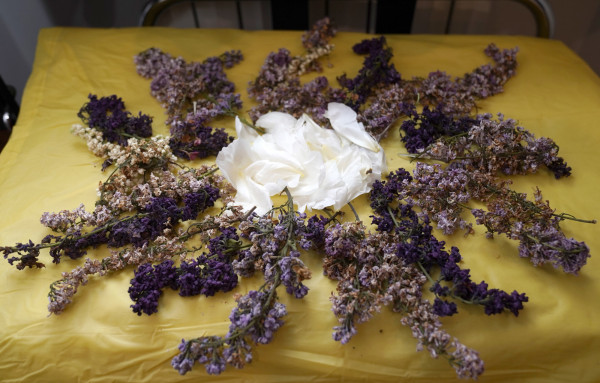
Vija VĒTRA
- Dancer, choreographer, lecturer and pedagogue
- Born on February 6, 1923, in Riga
- Pioneer of the Indian and sacral dance movement in Latvia; introduced sacral dance as part of worship in Australia, England, the USA and Latvia
- During World War II she studied in Austria - at the Academy of Music and Fine Arts in Vienna, and at the Ballet Department of the Vienna Conservatory
- She trained in Indian classical dance in India, Spanish flamenco in Spain, modern stage dance in Austria and the USA
- In 1948 she emigrated to Australia, where she opened a dance studio in Sydney in 1951
- Since 1964 she has lived in the USA, in a social home in Greenwich Village, Manhattan
- Since 1990 she has been visiting Latvia every summer with dance masterclasses and concerts
- In 1993 she founded a Unitarian-Universalist congregation in Riga, leading annual retreats during her visits to Latvia
- Three documentary films: "Heartbeat" (by Indian Government Film Dir., 1973), "Vijaya" (dir. I. Kolmane, studio Deviņi, 2004), "The World of Vija Vētra" (dir. A. Kostic, N.Y.C., 2007)
- Two books: "Vija Vētra. Dance and Soul" (“Vija Vētra. Deja un dvēsele”. N. Ikstena, Atēna Publishing House, 2001), "Vija Vētra. Dance - My Life" (“Vija Vētra. Deja - mans mūžs”. L. Brīdaka, Publishing house: SIA Modris, 2013)
- In 1999 she received the Order of the Three Stars
- Never married, no children
